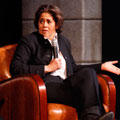Director Constance Marks at Cinema Cafe during the 2011 Festival. Photo by Sonia Recchia.
Nate von Zumwalt
What is film without discussion and debate? Or more to the point: What is the purpose of a film festival if the narrative ends when the reel runs out? Off Screen was created to keep the story alive, to ignite conversation, and to extend film beyond the movie theatre. This robust and engaging array of events and panels was expressly designed to complement the 181 films selected for the 2012 Sundance Film Festival.
“The whole point is to try and give some visibility to the films and the filmmakers,” says Sundance Institute Senior Programmer John Nein, who curates the Off Screen lineup. “Obviously they speak for themselves in a certain way, but what you don’t get from a screening is a conversation between different films and filmmakers. That’s what you get with a panel.”
Peculiar panelist pairings have become a hallmark of the program—Michael Moore and Harry Belafonte in 2011, and Stacy Peralta (Bones Brigade) and Ice T at this year’s Cinema Café come to mind. These odd couplings have become a reliable source of thought-provoking (if not provocative) discourse, from bouts of verbal sparring to flashes of enlightening insight. Expect the unexpected.
“You get very interesting and unpredictable conversations when you put together people who don’t necessarily have something in common on the surface,” adds Nein. “It’s a really interesting group of people, and I have absolutely no idea what will happen with them.”
Let’s take a closer look at this year’s highlights:
Power of Story
Back for its second year, the Power of Story series, presented in conjunction with Time Warner, enlists an elite group of high profile filmmakers and industry leaders to hold forth on topic-specific discussions. In the first Power of Story panel dubbed “How Docs Changed Change,” Robert Redford, Nick Fraser, Sheila Nevins (president, HBO Documentary Films), and moderator Soledad O’Brien (CNN) lead a deep-diving discussion exploring the evolution of nonfiction filmmaking over the last 30 years.
Even Nein acknowledges that the bulky theme isn’t best suited for a 90-minute time frame, or any restrictions for that matter. “These people could probably talk for 10 hours about this,” he says. “But how often do you get all of the people on the stage at the same time that are really the decision makers?”
The other headlining panel of the series, “In the Beginning,” will feature a group of distinguished writers excavating the nuances of the creative process and discussing work they admire. Oscar-winning screenwriter, Stephen Gaghan (Traffic), Pulitzer Prize-winning actress and playwright, Anna Deavere Smith (Fires in the Mirror), writer-director Andrew Stanton (Wall-e), and moderator Caryn James will share the stage and their stories from the front lines of the storytelling process.
Cinema Café
Beginning each morning at 10 a.m., Cinema Café at the Filmmaker Lodge is where you’ll discover a more informal brand of dialogue, and often between some unusual suspects.
“A lot of times you go to a panel and it has some prescribed topic,” explains Nein. “Cinema Café was developed with the idea that we don’t know where the conversation is going to go.”
It’s a section that boasts a lineup of big names and personalities, including Spike Lee, Stacy Peralta, Ice T, Julie Delpy, Parker Posey, and others. Oh, and as if the conversation isn’t enough, Filmmaker Lodge is stocked with your morning sustenance—coffee, treats, and more.
Sound Thinking, Profits and Losses, and Control Factor
These three panels embody the eclectic range of heady conversations and subjects visible throughout the Off Screen program.
Conceived as a counter-argument to the perception that sound has been unfairly limited to a supporting role in film, Sound Thinking seeks to thrust sound design to the forefront of the filmmaking conversation. “I’ve always wanted to do a panel about sound design,” says Nein. “It is an invaluable craft and art, just like cinematography, just like production design, just like direction, and it’s something that so rarely gets talked about.”
Control Factor, a discussion dedicated to science in film, inhabits similarly esoteric terrain. Scott Burns, the screenwriter of Contagion, and anthropological biologist Helen Fisher will venture to answer the question: Can good science make a good narrative? “That’s the panel that people look at and go, ‘I don’t know if I want to see science in film,’” says Nein. “But it’s always a really great discussion.”
Of course, the better half of the Off Screen program tends to mimic the trends on screen, and that’s never so evident as in Profits and Losses. Guests from the slew of docs that explore the economic meltdown will be on-hand to provide insight into this latest period of financial instability in the U.S. “This is a year in which we observed a lot of innate frustration with the direction of the country, and to me the films in the program this year reflected a very substantive approach to that frustration,” says Nein.
So if you’re in Park City this January, take a piece of advice: Enjoy the films. Indulge in them. But remember, there’s always a conversation to be had, and most of them will be happening all around you.
If you’re not attending the Festival, check our LiveStream schedule to watch panels live from anywhere in the world.




